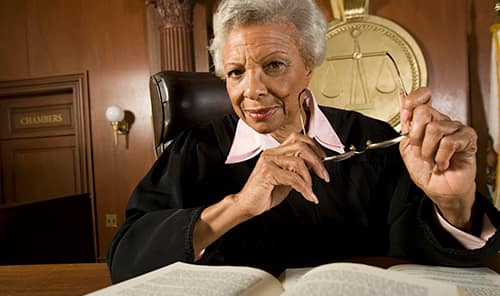Adult Guardianship or Conservatorship
or Power of Attorney?
Adult guardianship and conservatorship are terms that are used when a person is (in some way) incapacitated and can no longer handle his affairs and lacks capacity to sign a power of attorney document.
In some instances the term curatorship may also be used when it comes to handling the finances of another person.
We'll show you how the terms are used in various jurisdictions. We will also show you how and when a durable power of attorney can be used, if executed before a person becomes incapacitated.

Please Note:
On our pages for children we discuss Legal Guardianship
and the difference between guardianship, foster care, adoption and custody.
Included is a template for an Affidavit of Guardianship.
We also provide a Power of Attorney for Children
template and show you how and where you can use it as
an alternative to guardianship.
How to Get an Adult Guardianship Order
Only by going through a legal process can a person be appointed as a guardian or conservator, who can make decisions on behalf of someone who lacks capacity to do so, known as a ward. A person must be declared incompetent and you will need a letter from a doctor supporting an evaluation of incompetency.
Quite often this will typically be the case where a child, who has reached the age of majority (an "adult"), asks the court to be appointed as a guardian or conservator, because of the alleged mental disability or incapacity of a parent.
Obtaining adult guardianship is not an arduous process to go through if siblings are in agreement as to whom should be appointed and the required forms are often readily obtainable from the court.
During the court procedure the parent may appoint an attorney to appear on his behalf in order to communicate his best interests to the court.
Sidebar:
If the parent does not have an attorney then the court will
appoint a guardian ad litem to appear on behalf of the
alleged incapacitated parent.
This guardian ad litem is appointed for a limited period of time
(i.e. only for as long as it takes the court to make its ruling)
and solely to assist the court in its fact finding mission, in order to determine the
best interests of alleged incapacitated parent.
A guardian of an incapacitated adult must submit records to the court of his handling of the business and financial affairs of his ward, as and when required.
Incidentally, a guardian does not have carte blanche to enter into any and all financial transactions on behalf of his ward. He will need court permission in many instances, for example:
- Selling immovable property or using it as a guarantee against a business venture;
- Taking a loan out against the property - even if said loan will be used to take care of the ward.
Limited Guardianship of Elderly People
There may be further restrictions on which matters a guardian is authorized to handle on behalf of his ward.
If a person still has capacity to make decisions responsibly in some areas of his life, then the court will limit the guardian to only act in the other areas where the ward is deemed incapable of making rational decisions that are in his/her best interests.
A number of examples include where:
- A ward can no longer take care of the running of a retail business but can still manage his investment portfolio or take care of his rental properties.
- A person is declared incapable of managing his personal finances (a prodigal) and a court appoints a curator/guardian to direct any financial transactions on behalf of the prodigal, until such time as he is declared fit to manage his finances (by that same court).
- The above may also be applied to instances where said person suffers from a gambling addiction or substance abuse, which may lead to him squandering his finances.
- A person can no longer care for himself in his daily routine (i.e. bathe himself or buy groceries and feed himself), may be appointed a curator who will see to that person's day-to-day needs (a "Curator bonis")
As seen above, a Curator bonis refers to a guardian in charge of the goods, property and person of an incapacitated person.
Other instances will see the appointment of a curator, for example:
- A person is no longer capable of understanding the nature, purpose and consequences of their actions, due to mental injury or disability, will be appointed a curator in order to oversee any legal transactions made in favor of that person (a "Curator ad litem").
- Where minor children are the subject of divorce proceedings, a curator may be appointed to safeguard the best interest of the minor children (a "Curator ad litem").
As illustrated here, a Curator ad litem refers to a curator who represents a ward during legal proceedings.
NOTE: There may be periods when an adult cannot take care of his own interests and require the assistance of a guardian.
This need not be a permanent arrangement and could be terminated once the adult regains the ability to take care of his own affairs.
An example would be when a person suffering from Alzheimer's experiences a moment of lucidity (a "lucidem intervallum"). Any decision made during this so-called "lucid moment" may be enforceable in the eyes of the court, if a third party is able to prove that the person was lucid at the moment the decision was made.

What is Enduring Guardianship?
This is of particular interest to our site visitors from Australia.
In Australia an Enduring Guardian is a legal term for someone appointed to make decisions on behalf of another person as far as living and health matters are concerned. In this appointment there may be restrictions such as not being able to consent to medical treatment if it's against the will of the person.
More than one person can be appointed as an Enduring Guardian so as to take care of different functions.
For example: A sister is appointed to take care of accommodation and daily living arrangements and services whilst a son, who is a medical practitioner, is appointed to make decisions for health and dental care.
Our site visitors from Australia can get more information and applicable forms from the Public Guardian Website.
IMPORTANT NOTE: An Enduring Guardian does not have the power to make any financial decisions on behalf of someone else!
That function falls to the person appointed in an Enduring Power of Attorney Form, which is a separate legal document. Follow the link for more information as well as a free printable document.
Incidentally, in Queensland an Enduring Power of Attorney (one single document) can be drafted to take care of both financial and legal matters as well as the living and health matters of a person.
An enduring guardianship only comes into effect when someone no longer has the capacity to make these decisions himself and the enduring guardianship comes to an end upon the death of this person, or of it is revoked by a legal entity or by himself (whilst he still has capacity).

Difference Between Adult Guardianship and Power of Attorney
A Power of Attorney can only be signed whilst a person has mental capacity to understand the legal document.
A person may sporadically be deemed to be competent and if a medical doctor can determine that the person is well enough and mentally competent at the time of signing, the Power of Attorney will be valid. Ask the doctor to issue a written certificate of competency.
It is especially important to issue a Durable Power of Attorney to cater for the event a person becomes totally incompetent to sign the document. Follow the link to the articles where we cover this topic in depth.
You could also have a separate Medical Power of Attorney to empower a loved one to make medical decisions only. This person will not be empowered to make decisions regarding property or finances, to name a few.
A Power of Attorney is handled privately (out-of-court) and there is no requirement for regular reports to be submitted to the court.
There is an added advantage in that a Power of Attorney becomes effective as soon as the document is duly executed (i.e. followed the required legal procedure) or alternatively, on some future date specified therein. Conversely, an application for guardianship can take some months to effect an appointment.
Power of Attorney in the United States, Canada, United Kingdom, South Africa and New Zealand:
For our site visitors named above we provide extensive legal guidelines and a free template for drafting an Enduring/Durable Power of Attorney.
In the UK it's called a Lasting Power of Attorney and we provide specific legal guidelines in this jurisdiction.
What is the Difference between Guardianship and Conservatorship?
And What is Curatorship?
If someone cannot manage his affairs because he is incapacitated, then a judge can appoint a conservator to oversee his affairs. Depending on the jurisdiction, a conservator may also be called a curator or guardian and the incapacitated person is known as the ward.
There may be a further distinction:
- One person can be appointed as conservator of the estate, overseeing financial affairs;
- Another person can be appointed as conservator of the person, overseeing health and living matters;
- Alternatively, one person can be appointed as conservator to oversee all of the above.
Many people understand the term curator to denote the person in charge of a museum, zoo, art collection etc. However, it can also denote a person or persons authorized in law to take care of the person and property of someone who lacks capacity to do so himself.
So adult guardianship, conservatorship and curatorship encompass the same functions in this context.
It's only a matter of where the person resides, that determines which terminology will be used. Note that in some states in the USA the term conservator is used for the person who only handles the finances of his ward.

Co-Guardianship Orders
Take a look at the following scenario:
- John Senior is incapacitated and his brother seeks to be appointed as guardian or conservator to handle affairs on John Senior's behalf.
- John Senior's brother petitions the court to be legally appointed.
- John Junior, child of Senior, also wishes to be appointed and so petitions the court.
- John Senior does not have an attorney, and so the court appoints a guardian ad litem to represent John Senior's interests during the court proceeding.
- The court determines that John Senior is indeed not capable of handling his financial affairs and deems his brother (a registered accountant) the most suitable to be appointed as curator (guardian) of John Senior's money matters.
- The court also determines that John Senior is not capable of living by himself and appoints John Junior as co-guardian tasked to oversee John Senior's personal care, medical care, living arrangements and taking care of day-to-day decisions on John Senior's behalf.
Furthermore, the brother needs to keep meticulous accounting and submit proof to the court of John's income and expenses. John Junior is equally accountable for his actions to ensure John Senior is not neglected and being properly taken care of.
It is always easier to only have one curator or guardian appointed, because only one person will be accountable and the financial implications will be less onerous. However, if the court deems it in the best interests of John Senior, then co-guardians will be appointed.
Related Content:
- Free Power of Attorney Templates
- Choosing the Executor of a Will
- Bequeathing Estate Assets
- The Probate Process
Adult guardianship or conservatorship or the applicable Power of attorney are all aimed at taking care of our elderly loved ones in the best way possible and in a way that will best suit their personal and legal requirements.
You are here:



